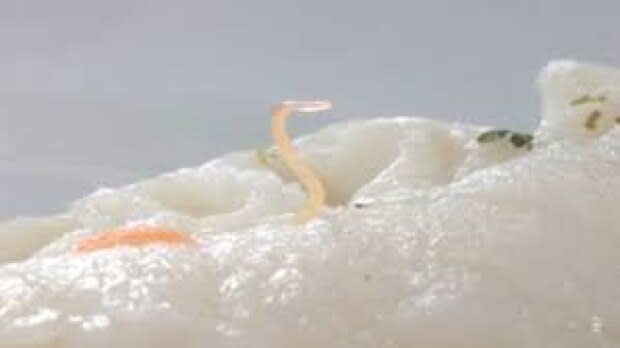Exploding population of parasitic sea worms a worry for endangered orcas, says U.S. researcher
A tiny parasitic ocean worm that's seen a population explosion since the 1970s may be contributing to the decline of endangered orcas, according to a Washington State researcher.
The worm population has exploded in tandem with the failure of fish-eating southern resident killer whales to thrive off the coast of British Columbia and Washington State.
The herring worms called anisakis have increased 283-fold in the past 40 years, according to a newly released study from the University of Washington in Seattle.
Author Chelsea Wood, an associate professor in the School of Aquatic and Fishery Sciences, suspects that's had a dire effect on southern resident killer whales because there is evidence they've been plagued by the parasites.

"We're especially worried about those [marine mammals] that are not doing well," said Wood, noting that southern resident killer whales populations are "tanking."
At last count the endangered group numbered 73.
Scientists from the U.S. National Oceanic and Atmospheric Administration tried with limited success in 2018 to deworm a juvenile whale dubbed J50 after finding a high burden of worms in her fecal and breath samples The emaciated, lethargic animal later vanished and is believed dead.
Wood suspects the worms in J50, also called Scarlet, helped kill the critically ill animal.
De-worming did help save an orphaned orca dubbed Springer back in 2002. After the animal was medicated, her appetite improved and she tripled her fish intake, eventually recovering and calving her own offspring.
Martin Haulena is head veterinarian for the Vancouver Aquarium and he says the parasite explosion may also be linked to the decline of salmon, reducing the number of hosts for anisakis.
"As each fish that a [marine mammal] eats is loaded with more and more parasites in the larval stage, then you can get a bigger and bigger parasite load," said Haulena.
He says the bigger the parasite load in salmon and fish, the more they build up in salmon-eating orcas. In most cases the parasite is a normal part of their gut, but he says there are critical points in an orca's development when they are more susceptible to the negative effects of the parasite.
He said malnourished or weak animals may end up with a "super infection" which puts an extra load on a young, developing animal.
Small public health concern for humans
Herring worms are found in wild fish and can also be transmitted to humans when they eat raw or undercooked fish. The tiny flesh-coloured worm is almost invisible on raw pink salmon.
"These worms are not fatal for people in general. They're not even particularly dangerous, but they're probably a cause of a large proportion of the cases of what we call food poisoning from consumption of sushi," said Wood.
If accidentally ingested the parasite can cause vomiting, nausea, diarrhea and abdominal pain.
In their more common hosts — including seals and whales — the worms are not a problem for healthy animals. But the parasite can penetrate the stomach lining in thin or weakened animals, boring into internal organs or causing a bacterial infection in the bloodstream.

"It's highly possible that worms are impeding the conservation progress for those endangered and threatened marine mammals," said Wood.
Parasites thrive when hosts thrive
It's not clear why anisakis worms are thriving. But there are theories.
The parasite became more abundant after the implementation of the 1972 Marine Mammal Protection Act, a U.S. moratorium for the protection of many marine mammals.
"Parasites profit when their hosts profit," said Wood.
But other factors include nutrient runoff from farms that helps feed small crustaceans called krill that host the worms. It also causes phytoplankton blooms that may increase worm populations.
She said climate change may also play a role.
"It's really tricky to attribute these global changes to particular drivers because everything's changing at the same time," said Wood


